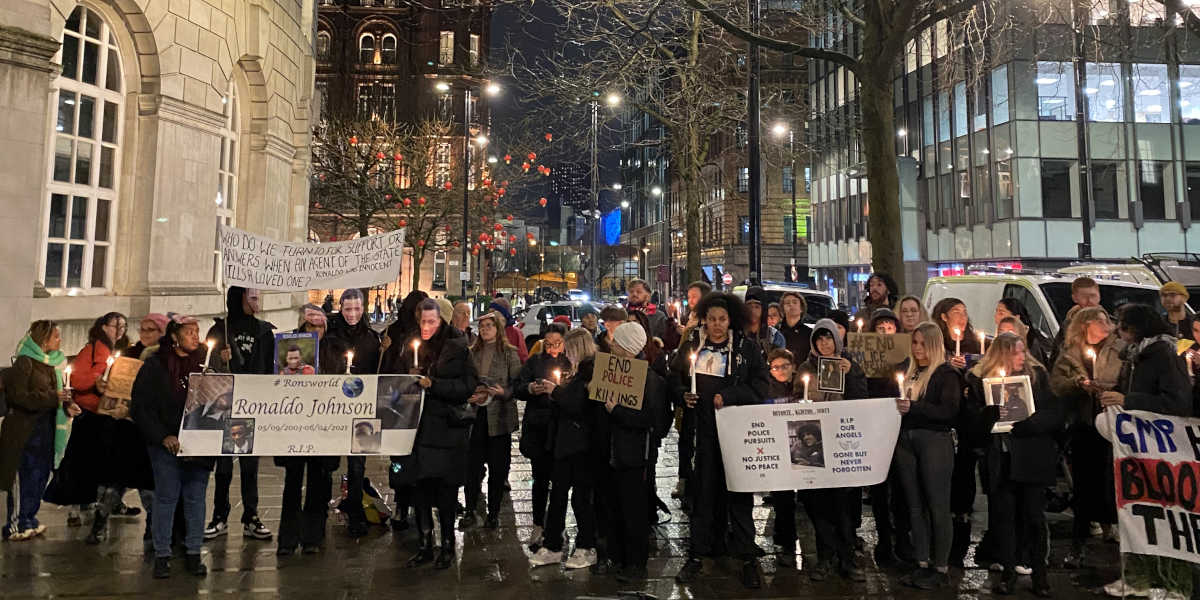Since 2020/21, there have been at least fourteen fatalities in road traffic incidents involving Greater Manchester Police (GMP). The majority stemmed from police pursuits. As members and supporters of the End Police Pursuits Families Campaign attest, these avoidable deaths are the result of the systematic over-policing of racially minoritised and working-class young people.
With support from Northern Police Monitoring Project (NPMP), the family-led campaign is calling for an end to unnecessary, high-risk police pursuits. In early February, they hosted a candlelit vigil and community meeting to remember loved ones outside Manchester Town Hall, before releasing their campaign’s demands. Crucially, they call for a ban on police initiating pursuits in circumstances involving non-violent offences or minor traffic violations, an intervention that has had success internationally.
The battle ahead for the campaign is to raise awareness about the risks of police pursuit – and to build wider public support for policy change.
Rising numbers
Back in 2021, at the height of the third national lockdown of the COVID-19 pandemic, Greater Manchester grassroots organisation NPMP began to witness a surge in reports of people killed in police pursuits. ‘At one point that spring it seemed like someone had died every time we opened the newspaper’, NPMP steering committee member Kerry Pimblott recalled.
The organisation responded by setting up a support service writing letters to those affected with information about the state processes they would encounter and the structures of legal support available. ‘No one expects to lose their loved one in this way. As a police monitoring organisation we felt a responsibility to ensure that the affected families knew what they were about to face and that there were people ready to support,’ Pimblott explained.
Avoidable deaths from police pursuits result from the systematic over-policing of racially minoritised and working-class young people
In the years since, data released by the Independent Office for Police Conduct (IOPC) has confirmed the fear that Greater Manchester was witnessing an unprecedented increase in deaths in road traffic incidents involving the police. In 2021/22, a total of eight people lost their lives. The majority were young working-class men and boys disproportionately from Black, Asian and Gypsy, Roma, Traveller communities reflecting patterns of systematic over-policing identified by NPMP.
Eight deaths in one year was the highest on record for GMP and the highest of any police force in England and Wales that year. To put that figure in wider context, an average of sixty people die on the roads in all circumstances in Greater Manchester each year.
However, campaigners observed a lack of action by local government despite the fact that GMP had been placed in ‘special measures’ by Her Majesty’s Inspectorate of Constabulary in December 2020. The Inspectorate identified systemic failings in the force’s overall service and recording processes – including its failure to record 80,000 reported crimes in a one-year period.
‘Beyond those directly affected, nobody in power seemed aware, let alone concerned that community members were losing their loved ones at the hands of the police at a rate never before witnessed in the recent history of our community,’ recalled Siobhan O’Neill of NPMP. ‘Nobody was asking why so many people were dying in police pursuits or how future deaths could be prevented.’
No accountability
The IOPC is the body responsible for investigating deaths following police contact and, where appropriate, making recommendations to local forces and the Crown Prosecution Service (CPS). But families express frustration with these investigations, which they describe as ‘often led by former police officers, unduly lengthy in duration, and rarely result in findings of misconduct’.
Prosecutions of road traffic officers are very rare. Of the ninety-seven IOPC investigations into road traffic incidents completed between 1 April 2012 and 30 September 2018, only two officers were prosecuted for pursuit-related incidents. Neither were convicted.
Ronaldo Johnson died in April 2021. His sister Keshia expressed her frustration with the inability of existing state processes to hold the police to account: ‘Why does the state, IOPC, CPS and the Coroner Service choose to ignore the consistent slaughtering of human life in order to protect the Police?’
Road traffic officers are empowered to make high-stakes decisions alone in a split second, with potentially life-altering consequences
Part of the challenge is what the families describe as the ‘tremendous discretion’ afforded to police drivers in determining when to initiate a pursuit. IOPC investigations and subsequent coroner’s inquests confirmed that in each of the families’ cases their loved ones died following pursuits in which the drivers of the pursued vehicles were suspected of minor traffic violations or nonviolent offences.
Among the alleged offences were failing to stop after overtaking too closely or turning right on a red light. Road traffic officers are empowered to make high-stakes decisions alone in a split second. Their choices have potentially life-altering consequences.
Devonte Scott died in May 2021. For his sister Marice, this power is too great and change is needed: ‘A single officer should not be able to self-authorise a pursuit, especially for a minor allegation, and cause such heartbreaking loss of life.’
Demanding change
The families point to studies conducted in Britain and other national contexts – including Canada, Australia and the United States – where the risks associated with high speed police pursuit have been deemed too great to justify the immediate physical apprehension of motorists who flee from the police for suspected theft or minor traffic offences.
On this basis, public officials in some major cities have revised their pursuit policies. Restricting the circumstances under which pursuits can be initiated has resulted in significantly fewer pursuits, collisions, deaths and injuries.
This is the central demand of the families and the only way to prevent another family from losing their loved one to unnecessary, high risk police pursuits.











